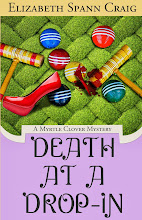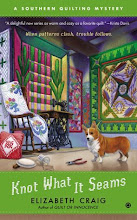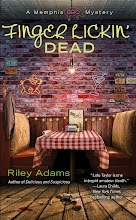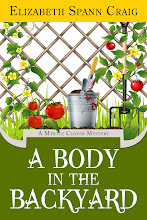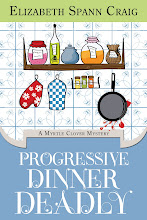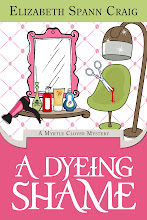By Elizabeth S. Craig, @elizabethscraig
Last December I was at a Christmas
drop-in and was hanging out near the back of the room…my favorite haunt at
social events. This spot is even better
if there is wine near the back of the room, which was the case for this party.
I’m sure I’m the despair of many a poor
hostess, but this one was doing a great job trying to engage me. “Let me introduce you
to my friend," she said. She brought me over to a
gentleman who was also standing in the back of a room, this one the
kitchen. “Elizabeth is a mystery
writer,” she said with a smile. Of
course I winced at being outed as a writer—you just never know how that’s going
to go. And the hostess continued, “Elizabeth, my friend is a botanist.”
I lit up.
The party flew by and I wasn’t the first person to leave this
time—perhaps not even the fourth or fifth person. I’d immediately gasped as if
I’d met a rock star and said, “So you must know all about poisons!” He did.
The poor man.
It was a good thing that no one else
found the botanist as fascinating as I did.
I completely monopolized him as I avidly picked his brain on North
Carolina poisons, emailing myself the information on my phone. My husband gave up trying to be part of our
conversation as I recorded poison after poison in complete delight. It was my
most favorite party ever. And—I got lots of information on Destroying Angel, a
type of mushroom that I’m using in my next book.
This made me realize that, introverted as
I am and as fond of computer research as I am—sometimes nothing beats primary
sources. The botanist loved talking about poisons and had ideas for
many different types. I could
immediately learn if they’d work for my story by asking how long before they
took effect, if they had a bitter taste that would prevent the victim from
continuing to eat/drink the item, etc.
I’ve also used primary sources to fill in
bits of research that would take forever for me to research online. Last year, I asked a successful barbeque
competitor how teams were set up for the Memphis in May barbeque competition
and what it took to win. I’ve asked cops
police procedural questions, particularly how they relate to small towns. And I’ve asked a former participant in beauty
contests exactly how one contestant could take revenge on another and ruin
their chances…and if these contests got that competitive (they can and do,
apparently).
Aside from the botanist, I’m usually
fairly organized when I contact a primary source. If I’m calling, I immediately explain that
I’m a writer (especially when I ask police officers murder-related questions!),
ask if there’s a good time to call them back or if they’re currently available,
and always make sure I have my list of questions in front of me. Email sometimes is a better way to
communicate with sources because then you’ve got it all in writing. I’m not fond of the phone, but sometimes
that’s preferred by the person I’m interviewing. And, as much as I dislike it, I probably do
get the information faster because I can ask follow-up questions right then
instead of having to email them back.
Something else I’ve found on these
occasions when I’ve talked with a primary source—I get ideas and information to
work with on other projects. Plus, it gives me extra inspiration to talk
with someone who really knows the topic I’m asking them about and who’s excited
about it.
I credit my source in my acknowledgments
and send them a signed book when it releases.
Have you ever used primary sources for
researching a book?
Image: Destroying Angel, Wikimedia Commons, Calvero






